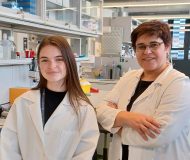

“la Caixa” Foundation has awarded a fellowship to Maria Edwards to carry out her doctoral research in the Gynecological and Peritoneal Oncology Group, led by Dra. Mª Virtudes Céspedes at the Research Institute of the Hospital de la Santa Creu i Sant Pau – IIB Sant Pau.
“la Caixa” Foundation’s INPhINIT doctoral and postdoctoral Junior Leader fellowships have the dual objective of supporting young talents to carry out their research in Spain or Portugal and also to attract foreign researchers to these countries.
Maria Edwards was born in the United Kingdom in 1996. She is a biologist specializing in nanomedicine, protein engineering and cancer treatment. After obtaining a degree in Biomedical Sciences from Cardiff University, she was a researcher in the industrial sector to develop and produce large-scale diagnostic tests for autoimmune diseases. She later returned to Cardiff University for an MSc in Research, in which he designed peptide-conjugated polymeric nanoparticles for the targeted delivery of breast cancer treatments. During this master’s degree, she received the Master of Excellence Scholarship and the Highest Performing Student award. Since November 2022, she has been doing his PhD program at the IIB Sant Pau, within the Advanced Immunology program of the UAB, where he designs nanoparticles conjugated with dopamine for the treatment of gynecological cancers.
Currently, she is executing her work to contribute to the development of new therapeutic strategies for gynecological cancers. The project builds on previous work characterizing the use of nanoparticles as vehicles to target therapy against metastatic cancer cells and the immune system, and the evaluation of the antitumor and antimetastatic effects of different nanoconjugates targeting dopaminergic signaling in gynecological cancers. This project will involve interactions with IIB doctors and scientists. Sant Pau, as well as biotechnological and pharmaceutical companies.
Studies will be conducted in combination with in vitro, ex vivo, and in vivo models (eg, tumor cell lines, mouse and human gynecologic cancer-derived organoids, and patient-derived xenograft models). The candidate will gain working knowledge of translational oncology and preclinical drug development.